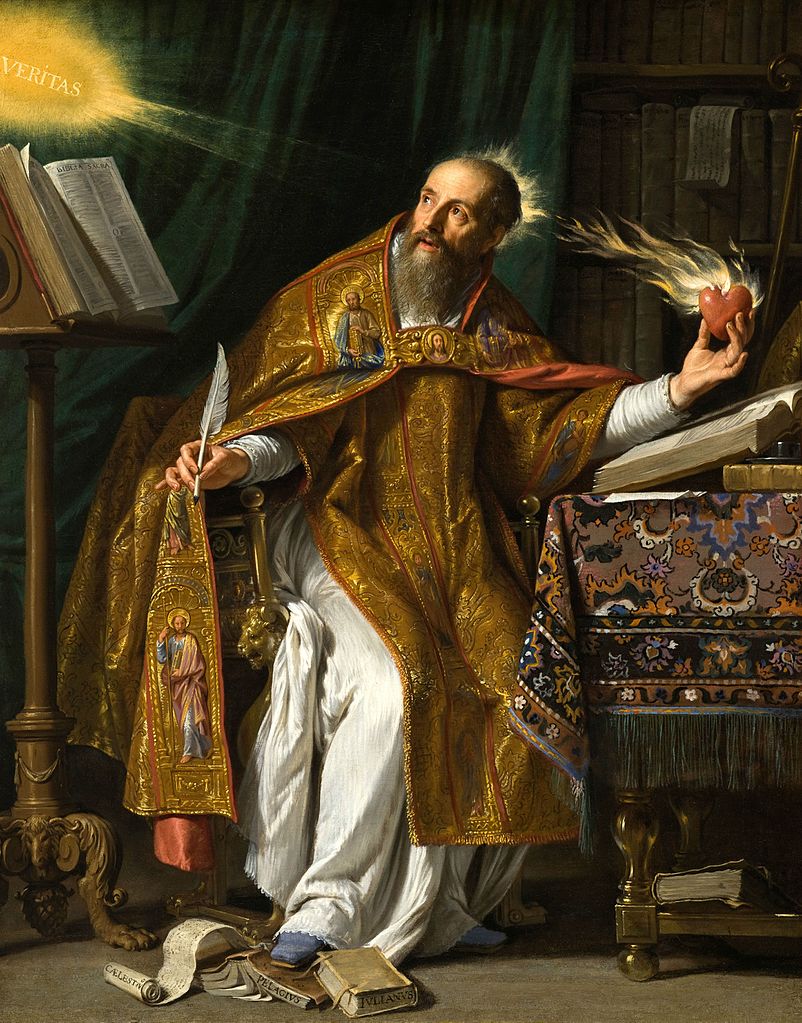Despite the wide-ranging topics in which he engages, Augustine’s thought is determined by one essential theme: The of interplay of two opposites, or as he would have it, seeing the eternal in the temporal.
But he has not neglected the one for the other, for he understands that the temporal is meaningless without the eternal, and vice versa, just as the body has no purpose without the soul, so human society cannot be free and just without the model of the City of Heaven.
It is precisely when eternity and mortality meet that truth can be discerned, and this truth has various definitions. For a person it means the discovery of one’s soul, which leads to happiness in the deepest sense. For society it means the embodiment of peace and justice, where equality is held supreme.
But Augustine is first and foremost a theologian; he has a purpose in mind; his philosophy is not merely speculative thought, but it serves a religious end. He is interested in knowing God and uncovering His plan for redemption through the use of reason. In other words, Augustine believes in order to understand, and understands in order to believe.
The interplay of eternity and temporality mirrors the relationship between a human being and God. Thus, in the Confessions Augustine describes the chaos that ensues when a person does not recognize the coherence of God’s plan.
Our lives are filled with unpredictability and uncertainty; we never know when death will strike, or when tragedy or hardship will destroy the stability we have built. His point is to show that history is neither autonomous nor independent, and the laws of cause and effect cannot lead to particular goals or ends. Rather, history only makes sense when it is placed within the context of eternity, that is, the unfolding of God’s grand scheme of things.
As is typical of Augustine, he begins with the particular and proceeds to the universal, as he does in the Confessions wherein he gives first an autobiographical account, from which he draws forth universal truths, and in The City of God he begins with the fall of Rome and proceeds to the eternity of the City of Heaven, in that the true Rome is not in Italy, but it is the heavenly Rome, which can never fall.
The theme of contending opposites no doubt harks back to his Manichean days, when he believed that the world was a battleground between two powerful forces, one good and the other evil, But after his conversion, Augustine takes this doctrine of opposites and transforms it.
He suggests that heaven and earth may well have contending and contrasting forces, yet from these two extremes, a person may choose the middle point between the two, which is the best course; and such is the process of virtue, which is the ability to make the best choice.
However, such a choice is not only a question of choosing between two extremes, for rationality is involved, which guides us to the rightness of a thing, which is also truth, which is also goodness and beauty.
Without the assistance of reason, Augustine reminds us, even virtue becomes a vice, since it is only pure excess. This is a crucial point in his philosophy, because he suggests that without ethics, virtue is nothing more than extreme belief, which exists for its own end and has no clear, or rather good, end.
Thus, to seek virtue, without any reference to God, is nothing more than arrogance, or as Augustine states, paraphrasing Aristotle, that a human being is not the best thing in the world. It is the soul that animates the body, and thus the soul is linked to the reality that lies outside the body.
Consequently, virtue properly belongs to the City of Heaven, and not to the City of the World. When we say we are being virtuous but have no perception of God, we are taking that which properly does not belong to us or the earth and forcing it to do our bidding, rather than using virtue to lead us to goodness and to beauty.
Therefore, virtue without God is nothing more ambition and pride, which were the very states that Augustine was in the beginning of the Confessions, when his life had no room for the City of Heaven.
When Augustine speaks of opposites, he does so not simply to draw attention to their nature, or to their machinations in our lives and in our world. Instead, he has a bigger and more philosophical purpose than either the Manicheans or the Neoplatonists, who were engaged in a similar process of thought. Augustine takes he argument to a wider, higher level by suggesting that despite this pull of opposites, harmony is possible, in the embrace of God’s love through Christ.
Without this love, the Manicheans are right, and creation is nothing more than a grand chess game between Good and Evil, with move followed by countermove; the end result of this game never to be known.
And without this love, the Neoplatonists are forever caught in the web of doubt, since the world is nothing more than corruption and change and impermanence, and we being of this world cannot ever perceive that which is perfect, permanent and eternal.
Augustine overcomes both these extremes by suggesting that we must seek to imitate and emulate that which is perfect, and once we have gained this understanding, we must seek to implement what we have learned upon this earth, so that all our actions, thoughts and concerns mirror that which exists in the City of Heaven. Therefore,
Augustine teaches not only the pursuit of spirituality, but also the striving for justice, peace, truth, goodness and harmony, which are all the result of love. In effect, it is love that must forever mark human life, and define it. Here, then, is the beginning and end of Augustine’s philosophy.
